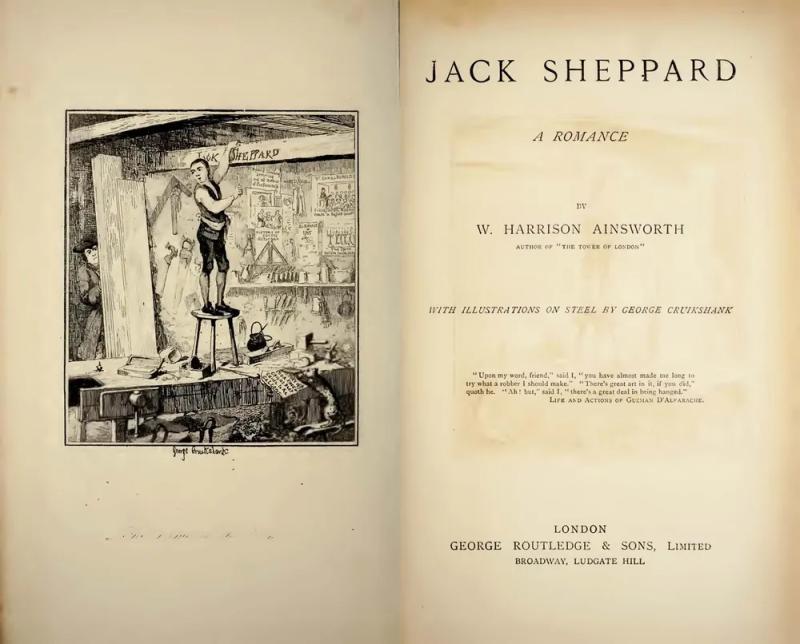5 Good Books That Inspired Bad Deeds
By: J.E.Luebering - Britannica

5 Good Books That Inspired Bad Deeds
A novel might frighten you, make you cry, or put you to sleep. But can a novel spur you to kill? Here are five novels that have been tied to terrible crimes.
The Foundation novels

Cover of the first edition of Isaac Asimov's novel Foundation (1951). Image: The Gnome Press
Isaac Asimov's Foundation trilogy— Foundation , Foundation and Empire , and Second Foundation —were published from 1951 to 1953. Their story of a vast empire's collapse and rejuvenation caught the imagination of the leaders of AUM Shinrikyo, a Japanese new religious group, and shaped the thinking that resulted in the group's gas attack on Tokyo's subway in 1995. Thirteen people died and some 5,500 were injured.
Jack Sheppard

Title page of William Harrison Ainsworth's novel Jack Sheppard (1839). Image: George Routledge & Sons
No one reads William Harrison Ainsworth's novels today, and that's a good thing: they're overwrought and tiresome. But during his heyday, in the first half of the 19th century, Ainsworth was hugely popular in England. That may have helped to encourage a Swiss valet, Bernard Francois Courvoisier, to claim Ainsworth's crime novel Jack Sheppard inspired him to murder his employer, Lord William Russell, in May 1840. It remains unclear whether Courvoisier actually read the novel or simply knew of it, but Ainsworth was horrified by the incident and began writing historical novels instead.
The Secret Agent

The Secret Agent - Image: Wordsworth Editions
Joseph Conrad published his novel The Secret Agent in weekly installments from 1906 to 1907. Its plot revolves around an attempt to destroy, with dynamite, the Greenwich Observatory. Although Ted Kaczynski—the Unabomber—was a wide-ranging reader, he was known to have read Conrad repeatedly, and the parallels between The Secret Agent and Kaczynski's own life prompted the FBI to contact Conrad scholars in an attempt to better understand his campaign of mail-bomb terror.
Stranger in a Strange Land

Stranger in a Strange Land - Image: Penguin Group USA
The Heinlein Society insists that it isn't true. Charles Manson is said to have denied having read the book. Yet claimed connections between Manson's "Family" and Robert Heinlein's novel Stranger in a Strange Land (1961) persist as a story that, evidently, seems too good not to be true. Articles in a San Francisco newspaper (picked up by the wire service UPI) and Time magazine in 1970 said Manson and his followers were inspired by Heinlein's novel, but the claims have never been substantiated.
The Catcher in the Rye

Reproduction of the cover of the first edition of J.D. Salinger's novel The Catcher in the Rye (1951). Image: Little, Brown and Company/Hachette Book Group USA
When Mark David Chapman was arrested after fatally shooting John Lennon in 1980, he had a copy of J.D. Salinger's The Catcher in the Rye with him. He later wrote to the New York Times insisting that a reading of Salinger's novel "will also help many to understand what has happened." In 2000 Chapman claimed the novel didn't cause him to murder Lennon but that he went too far in identifying with its protagonist, Holden Caulfield.
The Code of Conduct and Terms of Service must be complied with.
Any comment posted about politics or religion not relevant to the seeds/articles that are posted will be deleted.
The administrator reserves the right to delete any comment he considers to be offensive, off topic or of no value.
Videos or images or links to sources that the Administrator cannot open must be described or explained when requested or they will be deleted.





Would that information be considered a reason to ban those books from a school library?
I was a Heinlein fan in my youth. I have many paperbacks still in my collection.
I know you're not Charlie Manson and I certainly haven't seen any evidence of your being negatively affected by Heinlein's novels, other than what you want to call yourself.